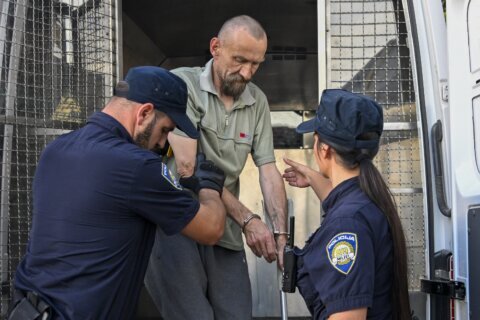BRUSSELS (AP) — The European Union’s executive commission Wednesday criticized rule of law developments in Hungary, Italy and Slovakia, but welcomed reforms in Poland and Spain in its latest democracy health check across the 27-nation bloc.
Across the board, EU countries had fully or partly addressed about two thirds of recommendations made by the commission in 2023, the EU executive said in its latest annual report on the state of the judiciary, anti-corruption efforts, press freedom and civil society.
“Protecting the rule of law is a continuous work,” European Commission Vice President Vera Jourová told journalists in Brussels. “We see that further action is still needed, especially where systemic issues and backsliding occur in some countries.”
Hungary had made no progress implementing any of the seven reform recommendations set out by the commission last year. They covered issues such as the prosecution of high-level corruption, the independence of public media and the health of civil society.
“Hungary is a real systemic issue for the commission about the rule of law,” European Commissioner for Justice Didier Reynders said.
The conclusion comes at a time of heightened tensions between Brussels and Budapest. Last week, the commission said that top officials will boycott informal meetings hosted by Hungary while the country holds the EU’s rotating presidency, after Hungary’s pro-Russian Prime Minister Viktor Orbán held a series of rogue meetings with foreign leaders about Ukraine that angered his European partners.
The commission has long been engaged in a protracted struggle with Budapest’s nationalist government in an effort to force it to comply with EU rule of law standards, withholding EU funds and hauling it to the bloc’s top courts.
Late last year, the commission released 10 billion euros ($10.9 billion) of frozen funds to Budapest following reforms, infuriating the European Parliament. But another 20 billion or so remains on hold, Reynders noted Wednesday.
There was no immediate response Wednesday from Hungary.
Jourová expressed concern about “the independence and funding of public service media” in Italy.
In May, journalists at Italy’s state-run broadcaster RAI went on strike to protest budget streamlining and what they saw as an increasingly repressive atmosphere for the media under the government of Prime Minister Giorgia Meloni.
“We have been expressing the need for safeguards for years now but with new incidents reported by stakeholders and budget cuts, this is becoming very urgent,” Jourová said.
Slovakia, under the government of populist Prime Minister Robert Fico, also got a poor report card on Wednesday. There was no progress on seven of the recommendations set out in last year’s report, and only “some progress” on one. Fico, long a divisive figure in Slovakia and beyond, survived an assassination attempt in May.
By contrast, the top EU officials praised progress in Warsaw and Madrid.
In May, in the wake of a change of government, the commission ended a six-year dispute with Poland, saying it had initiated the necessary changes to reverse what the bloc called the previous government’s backsliding on democratic principles.
Spain, meanwhile, had ended a years-long deadlock in renewing its General Council of the Judiciary, which supervises the country’s judges, due to disagreement between the government and the opposition. The breakthrough was in line with the urgings of the EU, Jourová noted.
Copyright © 2024 The Associated Press. All rights reserved. This material may not be published, broadcast, written or redistributed.







